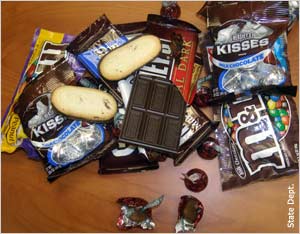The Internet and social networking were supposed to bring people together. But could it be that it “disconnects” them in certain ways?
That is what Secretary of State Hillary Clinton suggested January 21 when answering questions after her major foreign policy speech on Internet freedom.
Near the end of her appearance at the Newseum, the secretary took a question about Muslim youth being disaffected from their own governments and that of the United States. In her answer, Clinton suggested that youth the world over suffer from this “disconnect.” The reason: the Internet!
Here’s what she said: “Young people across the world are increasingly disconnected from authority, from government, from all kinds of institutions that have been historically the foundations of society, because they are so interconnected through the Internet….”
She noted that some young people spend more time on the Internet than with their families, and she added that this phenomenon was “something my generation can’t really understand.”
Well, I’m part of Clinton’s generation, and her comment was a real shocker to me! Why? Because, as a heavy user of the Internet, I often feel “disconnected,” too. In my case the disconnect is with what I see as a somewhat befuddling world of social networking.
Clearly there is a generation gap at work here, and Clinton addressed that: “When you think about the power of this information connection to young people, I don’t think it should cause panic in people my age…. We ought to figure out how to better utilize it.”
Here at America.gov, we’ve been working hard at reaching young people via Twitter, Facebook and blogs like this one. How effective do you think these efforts are? What do you think is the best way for government to meet the information needs of and connect with young people?

 Because of the phenomenon of social networking, autocratic regimes all over the world will either have to shut off or heavily restrict Internet access, or else prepare for their eventual doom, right? That seems to be the conventional wisdom. But I’m going to offer a contrarian view: the impersonal nature of Facebook groups, discussion boards and the like might actually make it harder for an advocacy group to coalesce over the longer term.
Because of the phenomenon of social networking, autocratic regimes all over the world will either have to shut off or heavily restrict Internet access, or else prepare for their eventual doom, right? That seems to be the conventional wisdom. But I’m going to offer a contrarian view: the impersonal nature of Facebook groups, discussion boards and the like might actually make it harder for an advocacy group to coalesce over the longer term. I figured one of my 30 or so Facebook friends who work with me at America.gov would read it and rise to action. At 10:18 a.m., Jason, of
I figured one of my 30 or so Facebook friends who work with me at America.gov would read it and rise to action. At 10:18 a.m., Jason, of